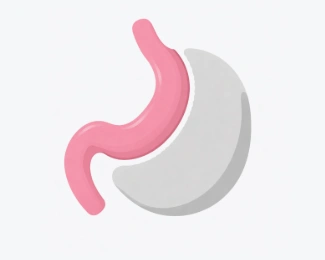What Happens to Your Stomach After Bariatric Surgery?
Jason Moy.webp)
Bariatric surgery leads to big changes — not just in how much you eat, but also in how your stomach works. If you’re considering gastric sleeve or bypass, here’s what actually happens to your stomach and digestion after surgery.
Gastric Sleeve: Smaller Size, Big Impact
In a gastric sleeve, about 75–80% of the stomach is removed. What remains is a narrow, tube-like “sleeve” that holds less food.
Key changes include:
- Permanent reduction in stomach size
- Lower production of the hunger hormone ghrelin
- Normal digestion, just with smaller food volume
Patients feel full after a few bites, and cravings naturally decrease — not through willpower, but because hunger hormones are reduced.
Gastric Bypass: Rerouted Digestion
In a Roux-en-Y gastric bypass, a small pouch is created at the top of the stomach and connected directly to part of the small intestine.
How this affects digestion:
- Food bypasses most of the stomach
- Calorie absorption is reduced
- Stomach acid and enzymes still work, but through a new pathway
This procedure is especially effective for improving metabolic conditions such as type 2 diabetes.
Digestion After Surgery: What Feels Different?
With either procedure, patients notice immediate changes in eating and digestion:
- Feeling full after just a few bites
- Needing smaller, slower meals
- Adjusting to food tolerances (some textures may be harder at first)
Your care team will guide you through phases: liquids → soft foods → solids, giving your stomach time to heal.
Can Your Stomach Stretch Again?
Yes — but only slightly. Over time, the stomach pouch can expand if you consistently overeat. However, it will never return to its pre-surgery size.
Healthy eating habits and portion control help you maintain long-term results.
Long-Term Benefits of a Smaller Stomach
- Better portion control
- Reduced hunger signals
- Improved blood sugar regulation
- Higher chance of sustained weight loss
Many patients also report less emotional eating and greater satisfaction with smaller, healthier meals.
Talk to an Expert About What to Expect
Every patient’s journey is unique. At BASS Bariatric Surgery Center, we explain how your stomach changes, guide you through diet stages, and support your long-term success.
Request a Consultation today to learn which procedure is right for you.

.webp)
